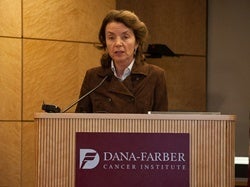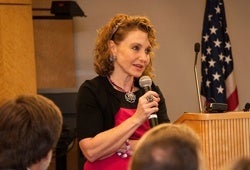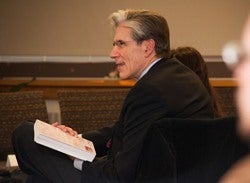November 6, 2012 — The difficult but transforming experience of facing and surviving cancer takes center stage in the personal and professional saga, Beauty Without the Breast, by Felicia Marie Knaul (Harvard University Press, 2012). An economist who has lived and worked on health and social development in Latin America for 20 years, Knaul is director of the Harvard Global Equity Initiative and associate professor at Harvard Medical School. She documents her personal and family experience, while directing a lens to the majority of women with cancer throughout the world, with a particular focus on poor women in low- and middle-income countries who face not only the disease, but also stigma, discrimination, and poor access to health care.
The wrenching contrast is the cancer divide, an equity imperative in global health. Knaul is dedicated to closing the gap—in prevention, treatment, and survival rates—that exists between these disparate worlds and their health care systems. “To think about other women who could not get the care I received because they had no money made me physically nauseous. There’s no justice there,” said Knaul.
At a book launch event at the Dana-Farber Cancer Institute in Boston on October 22, 2012, Knaul, her husband Julio Frenk, Dean of Harvard School of Public Health, their two daughters, and several colleagues presented myriad perspectives on the facts and dynamics of breast cancer, a growing global epidemic.
As a woman who learned that she had the disease while living in Mexico, Knaul documents her frightening experience, from diagnosis at age 41, through multiple operations including a mastectomy, to chemotherapy and subsequent treatment. Knaul does not shy away from discussing the impact that the disease had on her and her family, particularly on her children—her now eight-year-old daughter Maha and 16-year-old Hannah. She recounts moments of terror and celebration, as well as various coping strategies she developed.
Particularly moving are anecdotes involving Knaul’s daughters. For example, when Knaul said at a family gathering that she was having trouble coming up with a title for the book, Maha surprised all present by saying, “‘Mummy, I have the answer. Call the book ‘Beauty without the Breast!’ All the adults gazed at each other, amazed [at a child’s wisdom]. It fit,’” writes Knaul.
Also poignant are the selection of love letters written by Dean Frenk to her while they navigated the trauma of the disease. These are discussed and included in the book as an epilogue.

Counting herself a fortunate patient—Knaul had 24-hour access to top-notch cancer experts from the moment she was first diagnosed—the author transformed her personal experience to advocacy for women’s health rights. The diagnosis triggered Knaul to highlight and focus on the need for collective action by and for Latin American women, with special emphasis on barriers confronting lower- and middle-income women, who face delayed diagnoses, lack of access to treatment, pain control and education about the disease, poorer prognoses, and cataclysmic financial burdens.
The book also addresses the discrimination that women face from the machismo of men, family, and community—rampant throughout the world—which puts a negative impact on cancer that Knaul terms a malignancy. In her view, the machismo mindset—the assumption that men are superior to women, that women should be subservient, and that women without breasts are ugly—encourages men to abandon women who are diagnosed or suspected of developing the disease. The fear this engenders makes women avoid opportunities for early detection, including seeking regular breast clinical examination and forgoing mammograms, contributing to late-stage diagnosis and leaving them with little hope of survival.
Beauty without the Breast also documents how, armed with striking data about breast cancer—a leading killer of young women in developing countries—Knaul was catalyzed to launch Tomatelo a Pecho (Take it to Heart), a Mexican civil society organization committed to increasing evidence and breast cancer awareness and translating this information into more effective policies and programs.
Photos by Aubrey LaMedica

